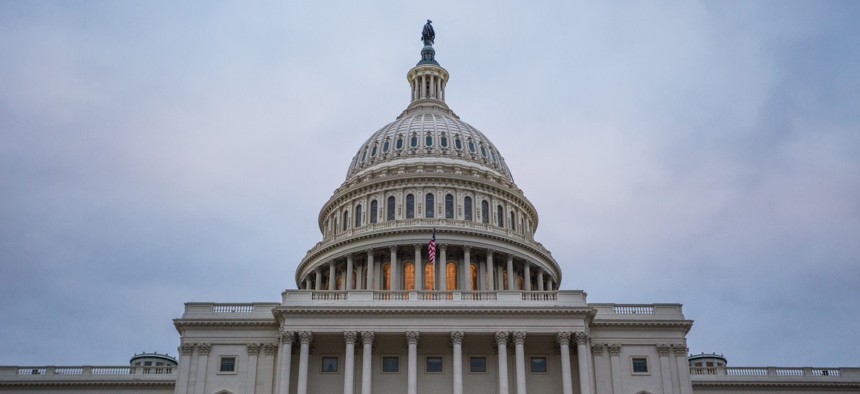
Michael Godek / Getty Images
Some Labor Authority and TSP Nominations Are Delayed After a Deadlocked Committee Vote
Although most of the nominees sailed through by voice vote, three of Biden’s key picks to govern federal labor relations and the federal government’s 401(k)-style retirement savings program were deadlocked in party-line votes.
The Senate Homeland Security and Governmental Affairs Committee moved forward on a number of President Biden’s picks to help lead federal workforce-focused agencies Wednesday, although a few will need the help of Majority Leader Chuck Schumer to be confirmed to their posts.
Four nominees—Leona Bridges, Michael Gerber, Stacie Olivares and Dana Bilyeu—to the Federal Retirement Thrift Investment Board, which administers the Thrift Savings Plan, and Krista Boyd, Biden’s pick to become the Office of Personnel Management’s inspector general, all sailed through by voice vote. Sen. Rick Scott, R-Fla., voted against all TSP board nominees, while Sen. Josh Hawley voted against Boyd’s nomination.
But Ernest DuBester, chairman of the Federal Labor Relations Authority who has been nominated for an additional term, and Kurt Rumsfeld, Biden’s nominee to become the FLRA’s general counsel, were subject to a 7-7 party-line vote. Republicans referred in veiled terms to allegations against the two nominees that were derived from a Freedom of Information Act request filed by James Sherk of the pro-Trump think tank America First Policy Institute on the eve of their originally scheduled committee vote last month and urged Democrats to wait until the matter could be investigated by the agency’s inspector general.
“The FLRA inspector general is now actively investigating these individuals, so it was a surprise and disappointment to me when the majority decided to press forward despite this fact,” said Sen. Rob Portman, R-Ohio, the top-ranking Republican on the committee. “It would be inappropriate to rush through these nominees while they are subject to an IG investigation. We’ve asked the inspector general to expedite its investigation, but until that investigation concludes, I must vote against advancing these nominees.”
Sen. James Lankford, R-Okla., cited an email where DuBester allegedly discussed with an official from the AFL-CIO the planned closure of an FLRA regional office in Texas and the potential value of then-Democratic Senate candidate Beto O’Rourke raising the issue, and referred to allegations of ex-parte communications, Hatch Act violations and “releasing unpublished information to outside parties.”
“There is page after page of issues here,” he said. “I don’t see why we don’t pause and wait for these to be answered, when the FLRA has a quorum and DuBester is already on board? Why we suddenly have to move this today doesn’t make sense.”
But Committee Chairman Sen. Gary Peters, D-Mich., said the allegations were “politically motivated” in an effort to “delay” DuBester and Rumsfeld’s confirmation while Republicans maintain a majority on the FLRA.
“[The nominees] have submitted detailed information that addresses what are politically motivated accusations by anti-labor activists,” Peters said. “Republicans have requested an investigation without even speaking to the nominees about their concerns, which is not the way I would hope we would operate.”
In letters to the committee, both Rumsfeld and DuBester strongly denied Sherk’s allegations, with Rumsfeld going so far as to call them “defamatory.” DuBester, who was accused of having improper conversations regarding the status of the implementation of Trump-era executive orders with a coalition of federal employee unions, said that allegation is an attempt to “smear” him based on the fact that he was a guest speaker at a meeting whose agenda included discussion of the topic, but that he had already left before that discussion began.
“The inference he tries to draw, without the benefit of a scintilla of evidence, is that I somehow must have engaged in ex parte communications because an FLRA matter was on the agenda,” DuBester wrote. “However, the agenda to which he refers was that of the [Federal Workers’ Alliance], not mine. I was on the agenda as an invited speaker but was not scheduled to speak to that agenda item and did not. I spoke to the group about the workings of the FLRA generally and left before the agenda item about the pending matter was reached.”
Also failing to advance was Javier Saade, Biden’s nominee to chair the Federal Retirement Thrift Investment Board, who stalled by a 7-7 vote. At issue in Saade’s case were a series of tweets he posted disparaging Republican politicians, which GOP senators said raised concerns about his ability to be fair toward Republican TSP participants.
“I cannot support Javier Saade, who showed a serious lack of judgment in a series of partisan social media posts," Portman said. “I’m concerned about his ability to serve in what is a totally nonpartisan role, because one of the obligations of the FRTIB is that decisions are not made on a political basis. That bias troubles me, because it needs to be without bias to all TSP participants, regardless of party.”
Peters said that in all cases where the committee’s vote was tied, he will work with Schumer to file discharge petitions to ensure they receive a confirmation vote before the full Senate, a route that has become more common with the body divided 50-50.







